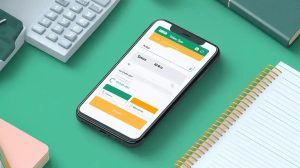Personal Finance Tracking Apps are transforming the way people manage their money. Instead of complicated spreadsheets or jotting things down in a notebook, you can now track every expense right from your phone with ease and clarity.
These apps help you see where your money goes, set financial goals, and even provide smart suggestions for better spending. All of this is personalized based on your real spending habits.
If you’re looking for more control over your finances without the hassle, keep reading to discover how these tools can revolutionize your money management.
What are Personal Finance Tracking Apps?
Personal finance tracking apps are digital tools designed to help individuals manage their money.
These apps allow users to track their income and expenses in real time. By doing so, users gain a better understanding of their spending habits and can identify areas where they might save more.
Many personal finance tracking apps offer features like budget creation, expense categorization, and financial goal setting.
Users can easily see how much they are spending in different categories, such as groceries, entertainment, and bills. This visibility makes it simpler to make informed decisions about money.
In addition to tracking spending, some apps also provide insights and tips to help users improve their financial health.
For example, they may suggest ways to reduce unnecessary spending or identify investment opportunities. Overall, personal finance tracking apps are valuable resources for anyone looking to take control of their finances and plan for a bright future.
Top Features of Finance Apps
Finance apps offer a range of features that make managing money easier for everyone. One of the most important features is the ability to create personalized budgets.
Users can set limits for different spending categories, which helps them stay on track and avoid overspending. This feature not only promotes better spending habits but also encourages saving for future goals.
Another key feature is expense tracking. Finance apps allow users to log their daily expenses quickly.
Many apps automatically categorize expenses by type, such as groceries, utilities, and entertainment. This makes it simple to see where money is going and to spot patterns in spending behavior.
Lastly, many finance apps include goal-setting tools. Users can set specific financial targets, like saving for a vacation or paying off debt.
The app can track progress towards these goals, providing motivation and support. With these powerful features, finance apps are designed to help users take control of their money and achieve their financial dreams.
Benefits of Using Tracking Apps
![]()
Using tracking apps offers numerous benefits that can greatly improve your financial health. One of the main advantages is increased awareness of your spending habits.
By tracking every dollar, you can identify patterns and make better choices. This knowledge helps you avoid overspending and make informed decisions about your budget.
Another benefit is the ability to set and achieve financial goals. Tracking apps allow you to set specific targets, whether saving for a car or investing in your education.
As you see your progress displayed visually, it motivates you to stay on track and reach your goals faster. This sense of accomplishment can boost your confidence in managing money.
Additionally, many tracking apps provide valuable insights and tips for better money management.
They can offer suggestions on how to cut costs or highlight areas where you can save more. These personalized recommendations enhance your financial literacy and empower you to take control of your finances for a brighter future.
How to Choose the Right App
Choosing the right app for personal finance tracking can feel overwhelming, but it doesn’t have to be. Start by identifying your financial goals.
Ask yourself what you want to achieve: tracking expenses, creating a budget, or saving for a specific goal. Knowing your priorities will help narrow down your options to the apps that fit your needs best.
Next, consider the features that are important to you. Some apps focus on budgeting, while others might excel at expense tracking or investment management.
Look for user-friendly interfaces and features that match your financial habits. Reading reviews and comparing options can help you find an app that really works for you.
Finally, think about any costs involved. Many finance tracking apps are free, but some offer premium features that require a subscription.
Weigh the benefits of paid options against free ones to see if the added features are worth the cost. Choosing the right app can make managing your finances easier and more enjoyable.
Comparison of Popular Finance Apps
When comparing popular finance apps, it’s important to look at their main features and how they meet different needs.
For instance, Mint is known for its budgeting tools and expense tracking, making it great for beginners. It automatically categorizes transactions and provides insights into spending habits.
This makes Mint a favorite among those who want to get started with managing their finances without a steep learning curve.
Another popular choice is YNAB (You Need A Budget), which focuses on helping users build proactive budgeting skills. YNAB encourages users to assign every dollar a job, promoting a more disciplined approach to spending and saving.
This app is excellent for those who want to improve their financial habits and have a hands-on approach to budgeting.
Lastly, Personal Capital stands out with its investment tracking capabilities. Besides budgeting, it offers features to analyze investments and retirement planning.
This app is ideal for users who are not only focused on budgeting but also want to grow their wealth over time. Each of these apps has unique strengths, so the best choice depends on your personal finance goals.
Tips for Effective Financial Tracking
![]()
Effective financial tracking starts with consistency. Make it a habit to log your expenses daily. By entering your spending as it happens, you keep a clear view of where your money goes.
This daily practice helps you identify trends in your spending and catch any surprises before they become bigger issues.
Another important tip is to categorize your expenses. Most finance apps allow you to create categories for different types of spending, like groceries, entertainment, and bills.
By organizing your expenses this way, you can see which categories consume the most of your budget. This insight allows you to make adjustments if needed and prioritize your spending on what truly matters to you.
Lastly, set monthly goals for your financial tracking. Whether it’s saving a certain amount or reducing unnecessary spending, having specific goals keeps you motivated.
Regularly review your progress to see how well you’re doing. Celebrating small achievements can boost your confidence and commitment to your financial journey.
Future Trends in Finance Tracking Apps
Future trends in finance tracking apps are exciting, especially as technology continues to evolve. One major trend is the increased use of artificial intelligence (AI) and machine learning.
These technologies will help apps analyze spending habits even better. For example, AI can provide personalized insights and advice based on a user’s financial behavior, helping them make smarter decisions.
Another trend is the rise of automation in finance tracking. Many apps are beginning to automate tasks like bill payments and expense categorization. This automation saves users time and reduces the chances of missing payments or overspending.
Users will be able to set their financial plans and let the app do the heavy lifting, making financial management easier than ever.
Finally, more finance apps are likely to focus on integrating with other financial tools and services. This means users can connect their banking, investing, and budgeting apps all in one place. This integration provides a complete view of one’s financial health and simplifies tracking.
With these trends, future finance tracking apps will become even more valuable for users seeking to take control of their money.
Personal finance tracking apps are essential tools for managing your money effectively. They give you the ability to track expenses, visualize budgets, and set financial goals.
By using these apps, you can easily understand your spending habits and identify areas where you might save more. This knowledge is key to achieving better financial health.
One of the main advantages of these apps is that they offer real-time data. This means you can see your financial situation as it changes, allowing you to make quick adjustments if necessary.
Many apps also provide alerts and reminders for bill payments, which helps prevent late fees and improves your credit score over time.
Furthermore, personal finance tracking apps come with features that can enhance your financial planning. Many apps offer insights into your spending patterns and suggest ways to manage your finances better.
With these tools, users can create actionable plans to reach their financial goals, whether it’s saving for a vacation, paying off debt, or building an emergency fund.




